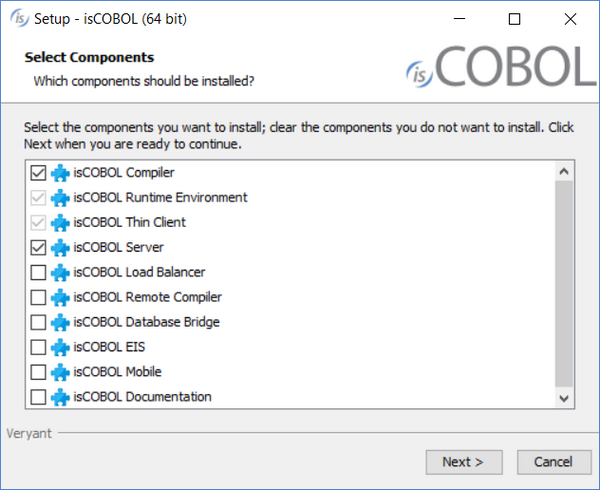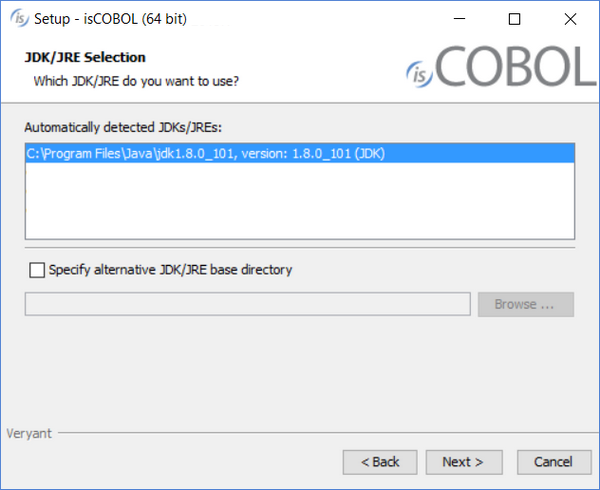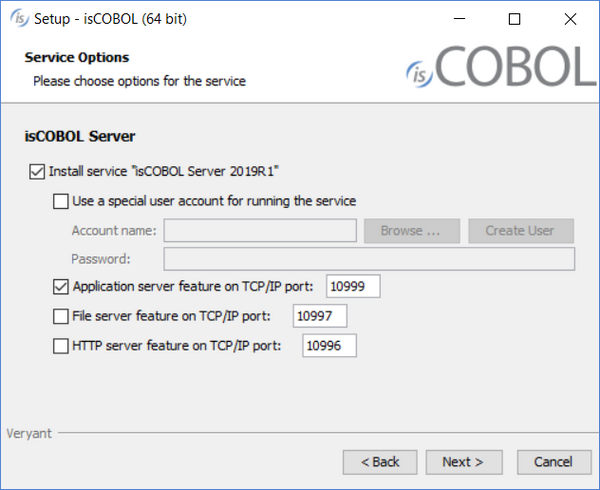Download and install isCOBOL Evolve
Windows
1. If you haven't already done so, Download and install Java (JDK or JRE).
2. Go to "https://www.veryant.com/support".
3. Sign in with your User ID and Password.
4. Click on the "Download Software" link.
5. Scroll down to the list of files for Windows x64 64-bit or Windows x86 32-bit. Select isCOBOLyyyyR_n_Windowsarc.exe, where yyyy is the year, r is the release number, n is the build number and arc is the system architecture.
6. Run the downloaded installer to install the files.
Note - If your Windows has the option "Run as Administrator", you should run the setup with that option, otherwise the setting of environment variables might silently fail. Environment variables setting is not necessary if you work from the isCOBOL Shell (explained later).
7. Select "isCOBOL Server" from the list of products when prompted.

8. Select your JDK/JRE when prompted

9. Choose if you want to install the Application Server as a system service or not. If you don’t install the service, you will have to start the Application Server in foreground mode from a command prompt as explained in Usage of isCOBOL Server. See Windows service and Unix daemon for details about the system service.

10. Follow the wizard procedure to the end. In the process you will be asked to provide license activation and perform it later, as explained in Activate the License.
Linux, Mac OSX and OpenServer
1. If you haven't already done so, Download and install Java (JDK or JRE).
2. Go to "https://www.veryant.com/support".
3. Sign in with your User ID and Password.
4. Click on the "Download Software" link.
5. Scroll down, and select the appropriate .tar.gz file for the product and platform you require.
6. Extract all contents of the archive. For example,
on Linux 32 bit:
gunzip isCOBOL_2020_R1_*_Linux.32.i586.tar.gz tar -xvf isCOBOL_2020_R1_*_Linux.32.i586.tar |
on Linux 64 bit:
gunzip isCOBOL_2020_R1_*_Linux.64.x86_64.tar.gz tar -xvf isCOBOL_2020_R1_*_Linux.64.x86_64.tar |
on Mac OSX:
gunzip isCOBOL_2020_R1_*_MacOSX.64.x86_64.tar.gz tar -xvf isCOBOL_2020_R1_*_MacOSX.64.x86_64.tar |
on OpenServer:
gunzip isCOBOL_2020_R1_*_FreeBSD.64.tar.gz tar -xvf isCOBOL_2020_R1_*_FreeBSD.64.tar |
7. Change to the "isCOBOL2020R1" folder and run "./setup", you will obtain the following output:
=============================================================================== isCOBOL EVOLVE Installation For isCOBOL Release 2020R1 Copyright (c) 2005 - 2020 Veryant =============================================================================== Install Components: [0] All products...................................... (no) [1] isCOBOL Compiler (includes [2] & [3])............. (yes) [2] isCOBOL Runtime Environment (includes [3])........ (no) [3] isCOBOL Thin Client............................... (no) [4] isCOBOL Server.................................... (no) [5] isCOBOL Load Balancer............................. (no) [6] isCOBOL Remote Compiler........................... (no) [7] isCOBOL Database Bridge........................... (no) [8] isCOBOL EIS....................................... (no) [9] isCOBOL Mobile.................................... (no) Install Path: [P] isCOBOL parent directory: UserHome JDK Path: [J] JDK install directory: JavaHome [S] Start Install [Q] Quit ============================================================================== Please press [ 1 2 3 4 5 6 7 8 P J S Q ] |
8. Type "4", then press Enter to select isCOBOL Server.
9. (optional) Type "P", then press Enter to provide a custom installation path, if you don’t want to keep the default one.
10. Type "S", then press Enter to start the installation.
Note - if the setup script is not available for your Unix platform or you don’t want to use it, just extract the tgz content to the folder where you want isCOBOL to be installed.
isCOBOL Evolve for UNIX/Linux provides shell scripts in the isCOBOL "bin" directory for compiling, running, and debugging programs. These scripts make use of two environment variables, ISCOBOL to locate the isCOBOL installation directory and ISCOBOL_JDK_ROOT to locate the JDK installation directory. To use these scripts set these environment variables and add the isCOBOL "bin" directory to your PATH.
For example, if you install isCOBOL in "/opt/isCOBOL" and your JDK is in "/opt/java/jdk1.8.0":
export ISCOBOL=/opt/isCOBOL export ISCOBOL_JDK_ROOT=/opt/java/jdk1.8.0 export PATH=$ISCOBOL/bin:$PATH |
Other Unix
A dedicated setup is provided for the following Unix platforms:
• Linux 32 bit
• Linux 64 bit
• Mac OSX 64 bit
• OpenServer
For any other UNIX platform, the MULTI setup can be used.
Extract the tar with the following command
gunzip isCOBOL_Version_multi.tar.gz tar -xvf isCOBOL_Version_multi.tar |
These two files are extracted:
o isCOBOL_Version.tar
o setup
Run the setup
./setup |
The setup script produces an output like:
=============================================================================== isCOBOL EVOLVE Installation For isCOBOL Release Version Copyright (c) 2005 - 2020 Veryant =============================================================================== Install Components: [1] isCOBOL Evolve platform independent files......... (yes) [2] isCOBOL ISAM Client component..................... (yes) Generate Components: [3] isCOBOL native libraries.......................... (no) [4] isCOBOL support for dummy terminal................ (no) [5] isCOBOL File Connectors........................... (no) Platform: [6] Operating System to generate...................... (Platform) Install Path: [7] isCOBOL parent directory: UserHome JDK Path: [8] JDK install directory: JavaHome [S] Start Install [Q] Quit ============================================================================== Please press [ 1 2 3 4 5 6 7 8 S Q ] |
The following text depends on the current environment:
Version | version of the isCOBOL components installed by the setup |
Platform | current operating system detected by the setup script |
UserHome | current user home directory |
JavaHome | current JDK/JRE directory detected by the setup script |
If points 1 to 8 contain accurate information, you can start the installation process by typing “S” and pressing Enter.
If you want to change any of the points, type the corresponding number and press Enter, then answer to the question. The output shown in the above snippet will be updated to reflect the change you made.
For example, if you want to avoid the generation of isCOBOL ISAM Client component
1. type “2”
2. press Enter
3. type “N”
4. press Enter
When every setting reflect your needs, type “S” and press Enter to start the installation process.
Point 1 can’t be changed while point 6 shouldn’t be set to an operating system different than the one where we’re running the script.
A C compiler is required for generating components (points 3 to 5).
If the MULTI setup completes without error, the following folder is generated:
isCOBOLVersion bin etc include javadoc lib native sample |
The content of the folders varies depending on the choices you made before issuing the “S” command.
Distribution Files
For information on a specific distribution file, please see the README file installed with the product.